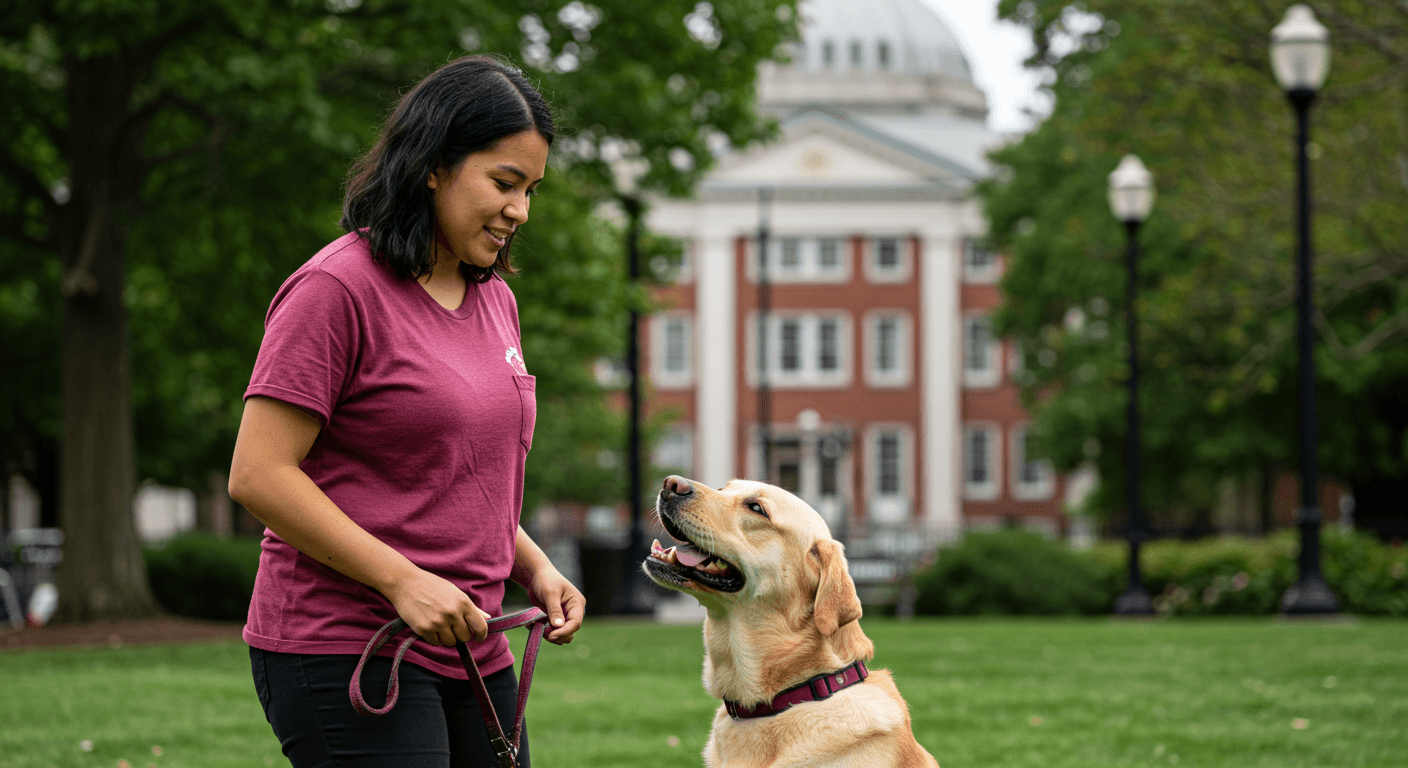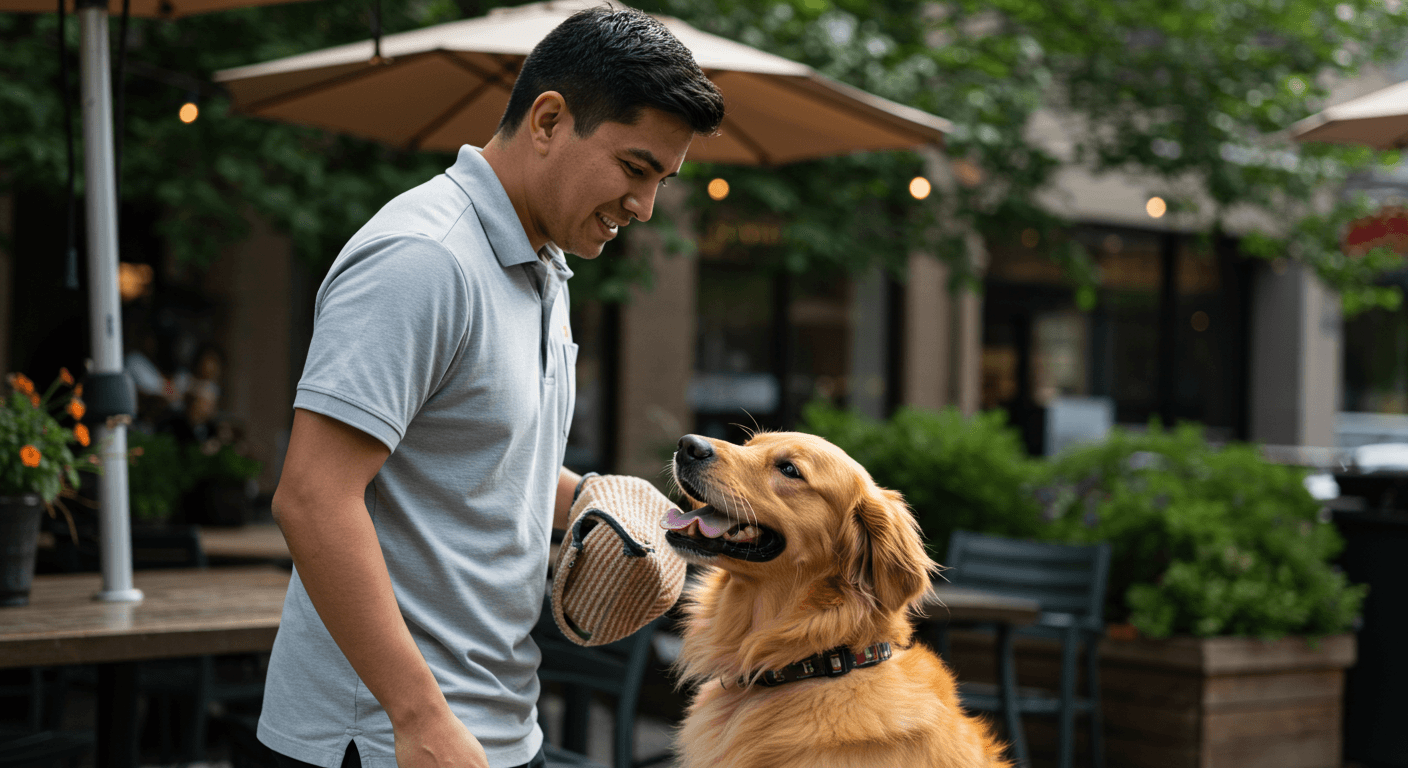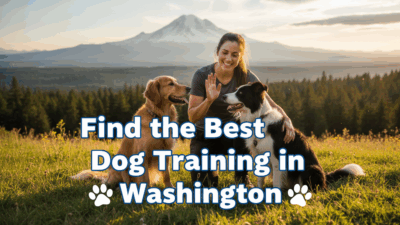Your Complete Guide to Choosing a Dog Trainer in Washington State
Washington dog owners face unique challenges, from rainy-season training adjustments to navigating busy urban parks in Seattle and Tacoma or managing off-leash etiquette in smaller communities. Whether you live in King County’s bustling neighborhoods, along the Puget Sound, or in Eastern Washington’s open spaces, your dog needs skills that match your lifestyle.
Finding the right professional dog trainer means looking for someone who understands Washington’s specific regulations, outdoor culture, and the balance between city living and trail access. Your dog should be comfortable whether you’re walking through Pike Place Market crowds, hiking the Cascade foothills, or visiting one of the state’s many dog-friendly breweries.
How to Choose the Right Trainer
Start by identifying what you actually need. Puppy training focuses on socialization, potty training, and building confidence during those critical early months. Basic obedience covers skills like loose-leash walking, reliable recall, and polite greetings. Behavior modification addresses problems like reactivity, separation anxiety, or resource guarding through careful, science-based protocols.
Look for trainers who emphasize positive reinforcement training rather than methods that rely on fear or discomfort. Washington’s dog-friendly culture values cooperation and trust, and reward-based approaches create lasting results without damaging your relationship with your dog.
Credentials matter when you’re comparing options. Common dog trainer certifications include CPDT-KA, KPA-CTP, and IAABC-CDBC for behavior cases. If your dog shows aggression, look for someone with CBCC-KA credentials or graduates of programs like CTC.
Consider where the training happens. In-home dog training works well for door manners, housetraining, and neighborhood leash skills. Group classes provide controlled socialization once your dog has basic impulse control. Private lessons let you customize everything around your schedule and goals, while board and train programs can accelerate progress when you’re short on time.
Ask about the trainer’s experience with Washington-specific situations. Do they understand how to work around winter weather when outdoor practice gets tricky? Can they help prepare your dog for crowded farmers markets or ferry rides? Do they know which local parks welcome training activities and which don’t?
Common Dog Training Methods Explained

Positive reinforcement builds the behaviors you want by rewarding your dog for making good choices. This approach strengthens your bond while teaching skills that last, and it fits perfectly with Washington’s humane standards for animal care.
Obedience training teaches the foundation skills every dog needs: sit, down, stay, come when called, and walking politely on leash. These basics make daily life easier whether you’re in urban Seattle, suburban Bellevue, or rural Whatcom County.
Puppy classes introduce young dogs to new experiences in a safe, structured environment. Good programs include handling exercises, bite inhibition practice, and controlled exposure to different surfaces, sounds, and people. Starting early prevents problems before they develop.
Leash training becomes especially important in Washington’s dog-dense neighborhoods. Your dog should walk calmly past coffee shops, bus stops, and other dogs without pulling, lunging, or tangling you up.
Behavior modification requires patience and expertise. Reactivity toward other dogs, fear of strangers, or separation anxiety all need systematic desensitization and counterconditioning. For serious cases, many trainers work alongside veterinary behaviorists to address both training and medical factors.
Service dog training and therapy dog training demand higher standards and public-access skills. These specialized training programs require clear goals, extensive socialization, and often take a year or more to complete properly.
Avoid trainers who use choke chains, prong collars, or electronic collars as their primary tools, or who talk about dominance and pack leadership. Modern, science-based methods are more effective and much safer for building a well-behaved dog.
Average Cost of Dog Training in Washington (Updated for 2025)
Prices vary across Washington depending on the trainer’s credentials, location, and the complexity of your dog’s needs. Urban areas like Seattle, Bellevue, and Spokane typically run higher than smaller towns.
| Service Type | Average Cost (Washington State) |
|---|---|
| Puppy classes (4-6 weeks) | $175-$300 total |
| Group obedience classes (4-6 weeks) | $180-$325 total |
| Private lessons (60-90 min) | $125-$220 per session |
| In-home training packages (4-6 visits) | $475-$1,050 total |
| Day training (trainer works your dog) | $500-$1,100 per week |
| Behavior consultation (initial) | $175-$300 |
| Board and train (2-4 weeks) | $2,200-$5,000 total |
Expect to pay more in King County and other metro areas, while rural counties often have slightly lower rates. Many expert dog trainers offer a free consultation or free evaluation to assess your dog and discuss options before you commit.
Travel fees may apply if you’re outside the trainer’s normal service area, and complex behavior cases typically cost more than basic obedience.
Questions to Ask a Potential Dog Trainer
- What training methods do you use, and how do you handle situations when my dog doesn’t respond right away?
- What certifications do you hold, and do you pursue continuing education like CPDT-KSA?
- How will you customize your training program for my dog’s personality and our Washington lifestyle?
- Do you offer private lessons, dog training classes, or board and train options, and which fits my goals best?
- How will we measure progress and know when to add more distractions or real-world practice?
- What are the total costs including any travel fees, and what’s your cancellation policy?
- Do you carry liability insurance, and can you provide proof?
- For behavior issues, will you collaborate with my veterinarian or a veterinary behaviorist if needed?
- What homework will I need to do between training sessions to help my dog succeed?
- Have you worked with dogs in Washington’s urban parks, on trails, or in other settings where I’ll actually use these skills?
Washington State Rules and Considerations
Washington enforces animal control regulations at both the state and local levels. County and city ordinances can vary, so check your specific area’s requirements.
Leash laws apply throughout most of Washington. Dogs must be leashed in public spaces unless you’re inside a designated off-leash area. Even well-trained dogs need to be under direct control, which usually means either on-leash or within voice command in permitted areas.
Washington State requires current rabies vaccination for all dogs over four months old. You’ll need documentation from a licensed veterinarian, and many counties require proof of vaccination during licensing. Find state guidelines through the Washington State Department of Health.
Nuisance barking and noise complaints fall under local ordinances. If your dog has separation anxiety or alert barking issues, work with your trainer before neighbors involve animal control.
Washington does not require specific licensing for dog trainers. However, if a trainer operates a boarding facility as part of board and train services, they may need business licenses and must follow local health and safety codes.
Liability insurance protects both you and the trainer during training sessions. Ask to see current coverage before starting any program, especially if training happens in public spaces or involves multiple dogs.
Some cities require pet licenses. Seattle, Spokane, Tacoma, and many other municipalities have annual licensing requirements tied to rabies vaccination records. Check your city’s website or animal control office for details.
Local Washington Resources for Dog Owners and Surrounding Areas
Washington offers abundant opportunities to practice training in real-world settings. These locations give you safe places to work on recalls, socialization, and impulse control while following posted rules.
- Magnuson Park Off-Leash Area in Seattle provides 9 acres of fenced space plus beach access for practicing recalls and water confidence in a controlled environment.
- Marymoor Park Off-Leash Dog Area in Redmond spans 40 acres, making it one of the largest in the state and perfect for building distance recalls and distraction work.
- Point Defiance Park in Tacoma offers trails and an off-leash area where you can work on leash manners and trail etiquette around other dogs and wildlife.
Many Washington State Parks welcome leashed dogs on trails, giving you excellent opportunities to practice loose-leash walking and focus work around natural distractions.

FAQs
How much does in-home dog training cost?
Most Washington trainers charge $125-$220 per private session, with package discounts when you book multiple visits. Behavior modification typically starts at the higher end of that range.
Is in-home dog training worth it?
Absolutely, especially for problems that happen at home. Your trainer can address door manners, jumping on guests, counter-surfing, and yard reactivity right where they occur, then move to your actual neighborhood for leash work and real-world practice.
Can you pay someone to house train your dog?
Yes, many trainers offer puppy training programs that include potty training, crate routines, and schedules. Day training can speed up the process while teaching you how to maintain progress independently.
What is the 3-3-3 rule for dog training?
This guideline helps set realistic expectations for newly adopted dogs: 3 days to decompress, 3 weeks to learn your routines, and 3 months to feel fully settled. Good training sessions work with this natural adjustment period rather than against it.
How long will it take to reach my training goals?
Most puppies and friendly adult dogs show solid progress in 4-8 weeks with consistent daily practice. Reactivity, fear, or aggression typically requires several months of gradual behavior modification with professional guidance.
What should I bring to group classes?
Pack a flat collar or harness, 6-foot leash, high-value treats your dog loves, water, poop bags, and current vaccination records if requested. Leave retractable leashes at home for safety reasons.
What’s the leash law in Washington?
State law requires dogs to be under control at all times. Most counties and cities interpret this as on-leash unless you’re in a designated off-leash area. Check your local ordinances for specific requirements and fines.
Do I need a dog license in Washington?
Many Washington cities and counties require annual pet licenses. Seattle, Spokane, Tacoma, Bellevue, and other municipalities tie licensing to rabies vaccination records. Contact your local animal control office for specific requirements and fees.
What shots does my dog need in Washington State?
Washington requires rabies vaccination for all dogs over four months old. Your veterinarian may recommend additional vaccines like distemper-parvo, bordetella, and leptospirosis based on your dog’s lifestyle and exposure risks.
Are dog trainers required to be licensed in Washington?
No special state licensing exists for dog trainers in Washington. Trainers operate under standard business regulations. If they offer boarding as part of dog training services, they must follow local health and safety codes for kennel facilities.
Where can I practice off-leash recall?
Use fenced dog parks or private, enclosed spaces to keep practice safe and legal. Washington has many excellent off-leash areas in Seattle, Spokane, Tacoma, Bellevue, and smaller communities throughout the state.
Which dog parks allow training around Washington?
Most off-leash areas welcome training as long as you follow posted rules and don’t disrupt other visitors. Magnuson Park and Marymoor Park are particularly good for structured practice during quieter morning or weekday hours.
What beaches or trails allow dogs for training?
Many Washington State Parks allow leashed dogs on trails. For beach access, check local regulations as rules vary. Some beaches permit leashed dogs year-round, while others have seasonal restrictions to protect wildlife.
What if my dog is aggressive toward other dogs?
Seek help from a certified dog trainer with experience in behavior modification and aggression cases. Never take a dog with a bite history or serious reactivity to crowded dog parks. A professional can create a safe, gradual plan to help your dog improve.
How do I find a top dog trainer near me?
Look for trainers with recognized credentials, liability insurance, and positive reviews from local clients. Ask about their training methods, experience with your specific issues, and whether they offer a free evaluation to assess your dog’s needs.
The right combination of skilled guidance, humane methods, and consistent practice in Washington’s diverse environments will help your dog become a confident, well-behaved companion. Take time to research your options, ask thoughtful questions, and choose a trainer whose approach matches your values and goals.
